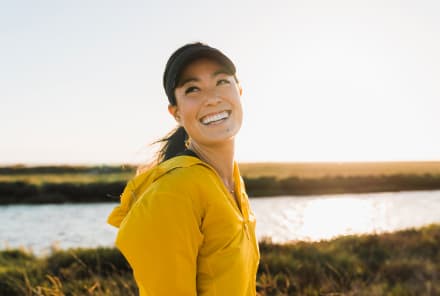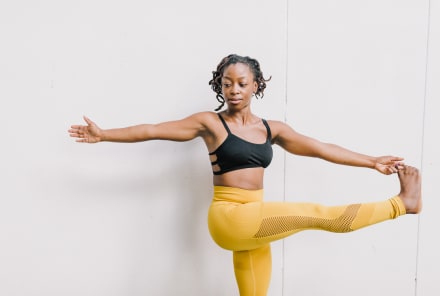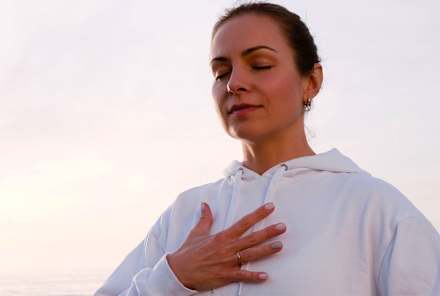Advertisement
Are Your Antioxidants Working For You During (& After) Your Workout?


Working out is a great way to relieve stress from the day. But exercise itself is a stressor. And although it is intentional stress to get stronger, run faster, or think more clearly (the list of benefits really goes on), it still produces free radicals in the body.
People who are incredibly active—like athletes—are at risk for short-term oxidative stress (aka when there's an imbalance of free radicals to antioxidants in the body). A reasonable solution is to up a person's antioxidant intake. But—and here's where it gets convoluted—some of this damage or stress from exercise is what helps muscles actually grow back stronger, and some people are actually hesitant of getting too much of certain antioxidants1 as they could interfere with the positive physiological adaptations of exercise.
Researchers of a study published in 2023, reviewed 20 years' worth of data to disentangle the role of antioxidants and oxidative stress on physical performance2. Here are their key lessons:
1. Resistance training causes short-term inflammation
For those familiar with exercise science, this finding won't come as much of a surprise.
Lifting, pulling, or pushing heavy objects damages muscles and promotes inflammation. It's the repair and recovery processes that are triggered afterward that promote muscle growth. If you strength train regularly, your body begins to adapt and recover faster after workouts and require more force or time under tension.
The goal of optimal recovery from strength training is to not prevent the oxidative stress from occurring in the first place, it's to reduce excess stress and expedite the repair processes. And that's where antioxidants come into play.
2. Certain types of antioxidants are most notable for supporting exercise-related inflammation
Antioxidants are found naturally in plant foods, but they can also be isolated as supplements. They promote optimal cellular function and fight free radicals to reduce oxidative stress. An antioxidant-rich diet is beneficial for overall health and preventing chronic disease, but they can also help you optimize your physical performance by:
- Protecting cells from exercise-induced oxidative damage
- Improving post-exercise muscle recovery
- Reducing inflammation
The antioxidants most notable for this include:
- Resveratrol
- Quercetin
- Curcumin
- Coenzyme Q10
- Spirulina
- Vitamin E
- Vitamin C
Vitamin C, in particular, has garnered the most controversy in the sports world over the years. That's because some studies have found that vitamin C at high supplemental doses of 1 gram or more per day may hinder beneficial training adaptations3. However, the general consensus is that vitamin C from whole-food sources can help reduce oxidative stress without negatively impacting training and a large meta-analysis showed that vitamin C supplements do help reduce muscle damage after exercise4.
But this doesn't mean you have to take individual supplements for each nutrient. Certain multivitamins and greens powders pair vitamins and these other plant bioactives together.
3. Antioxidants support a healthy gut microbiome (and therefore internal antioxidant status)
The gut microbiome plays a role in almost every aspect of health, including inflammation and oxidative stress. Research shows that consuming antioxidants has positive changes on the composition of the number and types of bacteria that make up the gut microbiome. And at the same time, the beneficial gut bacteria produce beneficial compounds when they metabolize antioxidants. It's a win-win scenario.
The takeaway
Intense exercise can cause muscle damage, and without the proper recovery plan, it can set you back in the weight room or on the leaderboard, increase your risk of injury and possibly increase your risk of chronic inflammation5 in the future. Eating an antioxidant-rich diet and supplementing for additional support can help you get the most out of your fitness routine. But most importantly, being physically active is overwhelmingly known to help prevent oxidative stress 6and its related conditions (like heart disease, diabetes, and Alzheimer's disease). Well-trained athletes actually have a more robust internal antioxidant system than less active individuals.
Don't be scared of exercise-induced inflammation. Take control of it through your nutrition so you can continue being as active as you can for as long as possible.
6 Sources
- https://www.ncbi.nlm.nih.gov/pmc/articles/PMC9241084/
- https://www.ncbi.nlm.nih.gov/pmc/articles/PMC10220679/
- https://pubmed.ncbi.nlm.nih.gov/25790792/
- https://pubmed.ncbi.nlm.nih.gov/32162041/
- https://www.ncbi.nlm.nih.gov/pmc/articles/PMC6962351/#:~:text=Conclusion%3A%20In%20summary%2C%20intense%20long,periods%20can%20achieve%20maximum%20benefit.
- https://www.ncbi.nlm.nih.gov/pmc/articles/PMC5908316/#:~:text=Moderate%20exercise%20and%20an%20active,like%20Alzheimer's%20disease%20%5B52%5D.
Watch Next
Enjoy some of our favorite clips from classes
Enjoy some of our favorite clips from classes
What Is Meditation?
Mindfulness/Spirituality | Light Watkins
Box Breathing
Mindfulness/Spirituality | Gwen Dittmar
What Breathwork Can Address
Mindfulness/Spirituality | Gwen Dittmar
The 8 Limbs of Yoga - What is Asana?
Yoga | Caley Alyssa
Two Standing Postures to Open Up Tight Hips
Yoga | Caley Alyssa
How Plants Can Optimize Athletic Performance
Nutrition | Rich Roll
What to Eat Before a Workout
Nutrition | Rich Roll
How Ayurveda Helps Us Navigate Modern Life
Nutrition | Sahara Rose
Messages About Love & Relationships
Love & Relationships | Esther Perel
Love Languages
Love & Relationships | Esther Perel
What Is Meditation?
Box Breathing
What Breathwork Can Address
The 8 Limbs of Yoga - What is Asana?
Two Standing Postures to Open Up Tight Hips
How Plants Can Optimize Athletic Performance
What to Eat Before a Workout
How Ayurveda Helps Us Navigate Modern Life
Messages About Love & Relationships
Love Languages
Advertisement

Yes, There's A Longevity Vitamin (& People Over 40 Need To Prioritize It)
Molly Knudsen, M.S., RDN

Yes, There's A Longevity Vitamin (& People Over 40 Need To Prioritize It)
Molly Knudsen, M.S., RDN

Yes, There's A Longevity Vitamin (& People Over 40 Need To Prioritize It)
Molly Knudsen, M.S., RDN

Yes, There's A Longevity Vitamin (& People Over 40 Need To Prioritize It)
Molly Knudsen, M.S., RDN









